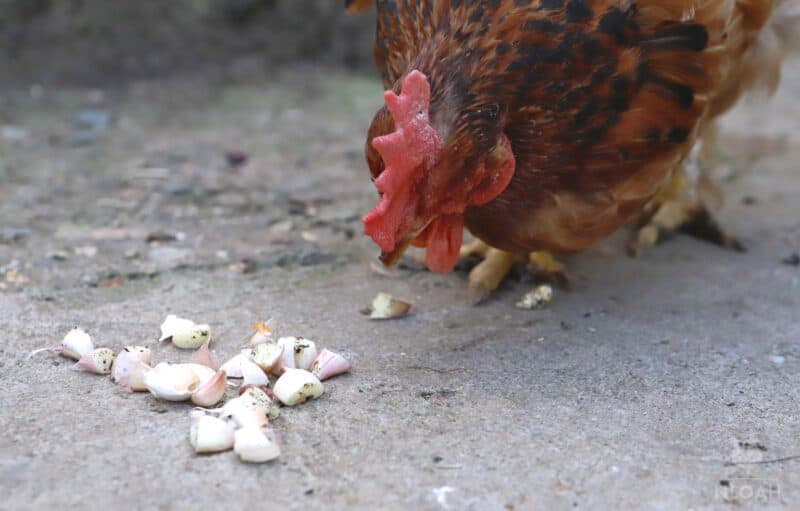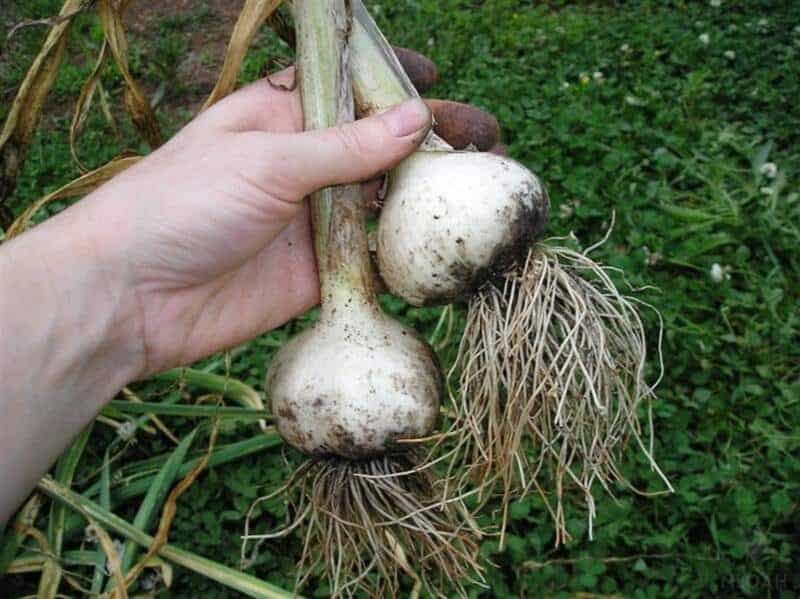Most homesteaders know that their chickens can eat all kinds of things, but there are a few items out there that are highly contentious.

Some folks claim that chickens can eat these items with no problems, while others claim they are bad news. One such food that constantly leads to arguments is garlic.
So what’s the real story? Can chickens eat garlic?
No, chickens should not eat garlic. Garlic and related vegetables can cause major problems for chickens by damaging red blood cells and eventually causing a form of anemia. Though very small amounts are probably not harmful, it does not take much for symptoms to develop.
As it turns out, there is plenty of research and other literature that supports the long time assertion of garlic naysayers when it comes to feeding it to chickens.
All you need to know is that you shouldn’t feed it to your birds, but if you want to learn more, keep reading.
Garlic is Toxic for Chickens
Despite all the he-said, she-said arguing on the subject, the real answer is pretty conclusive. Chickens, and pretty much every other bird and many other animals, should not eat garlic.
In fact, garlic is found on many lists of toxic plants for chickens, and some even have significant supporting sources.
The reason garlic is so bad for chickens has to do with a compound called thiosulfate, among other sulfides.
This substance is found in garlic, onions, and other allium vegetables and it damages red blood cells in chickens.
This usually only happens in high concentrations, or after eating a large quantity of veggies containing the stuff, but you can never be sure of exactly how much harmful compound an item contains.
This means that a small serving might not have any negative effects, while a larger one could cause your chicken to become seriously ill or perish.
Before you decide to listen to other owners concerning the feeding of garlic, ask yourself: are you willing to risk it if your birds are the ones paying the price?

Ingesting Garlic May Result in Tainted Eggs or Meat
Another reason to avoid feeding garlic to your chickens is that it may end up in their eggs or meat.
Or more accurately, it can cause meat and especially eggs to have a nasty, “off” or sulfurous taste. If you’re a fan of fresh eggs, you might not want them tainted because you decided to feed your flock garlic!
The same goes for chicken meat; if you’re raising birds for their meat, you don’t want it to have an off-putting taste.
Of course, this isn’t always the case. Some chicken owners report that their birds continued to lay delicious, edible eggs even after consuming small amounts of garlic while others say they noticed no difference whatsoever.
Another case where you might consider feeding your birds garlic is if you want to deworm them – and there are several ways to feed it to them, raw or cooked, three times a week. But this is more of a solution to a problem than a way to incorporate garlic into their diet.
However, there is always the chance that your outcomes could be bad, so it’s best to play it safe and keep the stuff away from your flock even in limited amounts.
Effects of Garlic Toxicity
Garlic is not profoundly deadly for chickens like, say, yew or hemlock, but it nonetheless is quite dangerous once they ingest enough or a portion with a high concentration of the harmful compounds.
Typical symptoms of garlic poisoning in birds and specifically chickens include lethargy, pale combs and wattles, decreased appetite, diarrhea, weakness, breathing difficulties and general depression.
But it is anemia caused by garlic poisoning that is the most serious and common of long term health effects.
A study published in 2006 found that thiosulfate can cause Heinz body anemia in chickens, which is when the red blood cells are damaged and have difficulty transporting oxygen.
Other research has shown that thiosulfate can also cause methemoglobinemia, which is when the iron in red blood cells is oxidized and can no longer carry oxygen. This can lead to serious respiratory problems and can even be fatal.
While high concentrations of thiosulfate are usually needed to cause these problems, the stuff is relatively abundant in garlic and other allium vegetables.
Chickens Don’t Need to Eat Much Garlic to Have a Bad Outcome
Multiple sources have shown that a chicken eating as little as half a percent of their body weight in garlic or other allium vegetables can be toxic.
This means that a chicken eating two average cloves of garlic could be in danger if they weigh just over six pounds.
Detractors might say that chickens are generally pretty good about avoiding things that aren’t safe eating, and they are, but when you’re dealing with something that chickens will, one, generally eat and, two, is potentially dangerous even in small amounts, the stage may be set for disaster.
Again, for safety’s sake it is best if you just don’t feed or let your chickens eat garlic at all.
Can Chickens Eat Garlic Raw?
No, chickens should not eat raw garlic. Thiosulfate present in garlic is not significantly reduced by cooking.
Can Chickens Eat Garlic Cooked?
No. Cooking garlic does not make it safe for chickens to eat as it does not significantly reduce the amount of thiosulfate present.
You Shouldn’t Serve Chickens Anything that Has Been Prepared with Garlic
On the topic of cooking, make sure not to serve chickens any food or dish that has been prepared with garlic or garlic powder, even it is something they could otherwise have.
This includes garlic bread, garlic mashed potatoes, pasta with garlic and oil, etc. These items are fine for people, but not good for chickens.
Aside from the obvious problems caused by the garlic itself, other ingredients like butter, salt, sugar, oil and the like are bad news, too.
At best, your birds could be facing some serious weight gain, but at worst other effects and diseases like salt poisoning, hypertension, fatty liver syndrome and more could result.
Baby Chicks are Especially Vulnerable to the Effects of Garlic
As you might expect, chicks are especially vulnerable to the effects of garlic poisoning and should not be fed any at any time.
What Should You Do If Your Chickens Eat Garlic?
If you think your chickens have eaten garlic or any other allium vegetable, the first thing you should do is remove any uneaten bits from their enclosure.
Next, keep an eye out for any symptoms of illness and contact a vet if you are concerned.
Garlic is not the most toxic of things a chicken could eat, and even in cases where symptoms are present you can probably save your bird’s life with prompt intervention.
Tom has lived and worked on farms and homesteads from the Carolinas to Kentucky and beyond. He is passionate about helping people prepare for tough times by embracing lifestyles of self-sufficiency.
